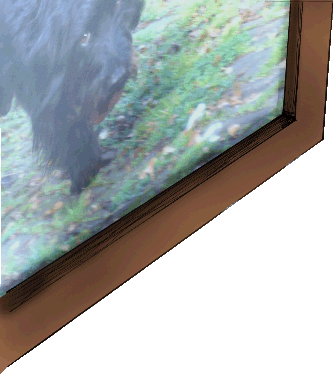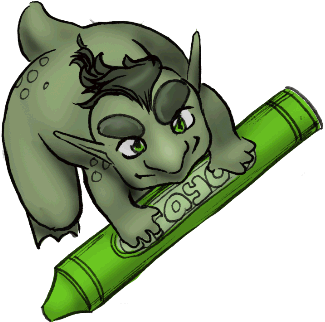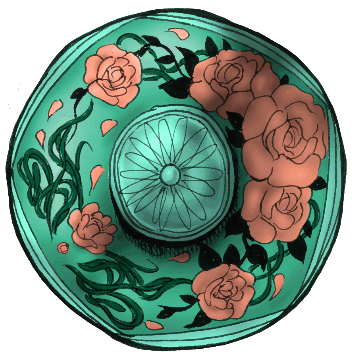that Joel, my fantabulous artist, has had his art displayed by the very funky Cuba Street gallery Eyeball Kicks. All three pieces sold within a couple of days. They were the proverbial hotcakes. None of us who know how talented Joel is are surprised but, of course, we are wicked pleased. Here is the man himself in the gallery window:
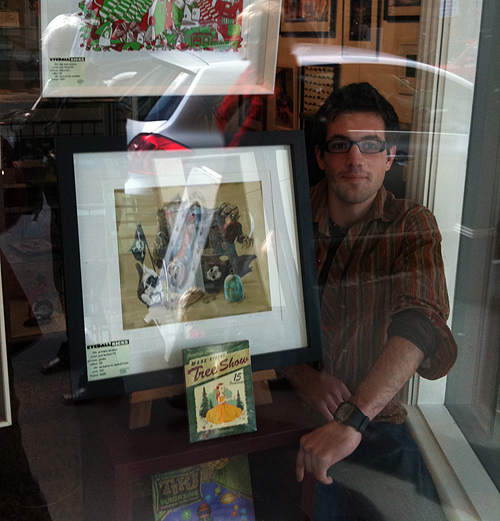
Eyeball Kicks representatives told me today that they plan to hang more pieces by Joel next week. Its your chance to get some Joel art before it appreciates stupidly! This is Primate Pirates, currently the last piece of his art left in the gallery:
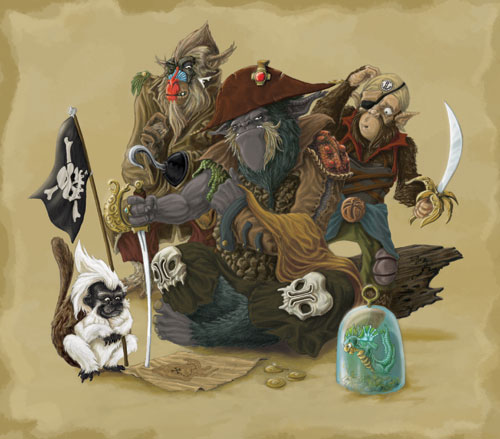
To s0me extent this blog acts as a store for inspiration. These mind toys are via Dinosaurs and Robots a blog I regularly read.
This 1882 suit was never used and is displayed in all its splendour in the National Maritime Museum in Paris.

These are some of my favourite netsuke from the latest Bonhams auction of netsuke and obi. They tend to either be beautiful representations of the natural world, to tell a story, or to be very expressive. Or all three of the above!
In this one an old man is opening a box. As he opens it the magic clam within extrudes a cloud of vapour loaded with treasures:

I also really like representations of oni. Here is one resting on a box – you can open it to reveal a little man lolled in a drunked stupor with an upended flask and sake cup falling from his hands.

The next one is either a normal man on a giant overturned sandal, or a tiny man on a normal sandal – you choose ^^

I love this boy holding a mask and the thoughtful monkey. The monkey is examining a grub caught in his fingers.


Finally, I am halfway through writing a piece of erotica and may have had an irresistible idea for a short horror piece. I am superstitiously scared of writing horror. I feel I’d rather create beauty. However, I don’t this the idea will leave me alone so in some form I am going to be doing something with it. Someone tell my muse I don’t do that stuff, mmm k?
Balloon monsters by Jasen Hakenworth

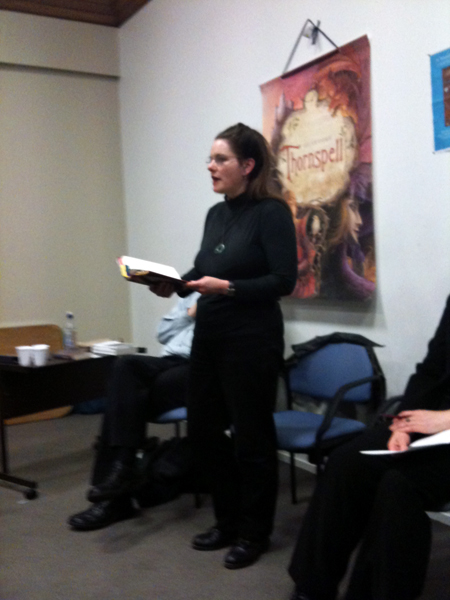
Last Thursday I attended Fantastic Voyages with Helen Lowe and Tim Jones each talking about their books and Speculative Fiction. It was an inspiring night with readings from both authors. Tim read part of his short story ‘When she came walking’ (which I loved) and Helen read from Thornspell. Of course, discussion was lively and informed, and the lily was gilded by the presence of Lynn Freeman who added both direction and interesting comments (I have learned that you can catch her programme after the fact here). We noted New Zealand’s fascination with Apocalypses and Tim said that he could have filled his recent collection of N.Z Sci – fi poetry, Voyagers, with apocalyptic poems from the 60s era.
In short, it was fascinating and fun. However, what I want to comment on here is not the food provided for the intellect by the discussion, but the joys of the social network that surrounded it. The Speculative Fiction community is growing rapidly and developing its own culture and voice. I was able to Tweet that I was heading to the Southern Cross for food before the event and find myself joined by several equally interested friends. The atmosphere of the event was one of shared pleasures and enthusiasm and was both warm and welcoming. One friend, Jenni, had never attended a Speculative Fiction orientated event and was thrilled to find that “everyone was very friendly and encouraging when Sally mentioned I’d just been published for the first time.”
After the event the two authors invited everyone to join them for a few drinks in Fidels:


Again, we shared a great discussion and huge amounts of mutual enthusiasm for SF. Everyone present was professionally supportive of one another and incredibly friendly. This exactly mirrors my experience of the SF community on every occasion. My first forays into it were via the yearly conferences organised by SFFANZ and associated groups each year (next years event is Au Contraire). I went at the urging of Mundens with a little trepidation. I suspected I would be surrounded by geeks and wondered how interesting it would all be. Well, I was surrounded by geeks, and that was fantastic. I felt like I was wrapped in a blanket of loving support for my work as a yet to be published author (as I was then), I found an incredible amount of great advice for my work, and some recognition which was a heady draught. I also found the fellowship of people with exotic and interesting obsessions, well developed personal outlooks, and considerable charm. All the guest authors were utterly welcoming. I learnt more in that first weekend than I had in all my life prior to that point about my vocation. Naturally, now I go every year, and will always continue to.
I think it’s possible that there has been a happy marriage of the energies of these conferences, the inspiration afforded by the success of our film industry, and the personal inclinations of the many good people involved in Speculative Fiction. There seems to be a quiet awareness that we are all writing our own new culture and are able to determine what it will be by our actions as individuals. In practise I am thrilled to see us choosing thusly: we will be warm and support each other in practical ways, we will engage in discussion to learn and share rather than to win, we have integrity in how we treat one another. There seems to be a general agreement that there is enough sunshine for all of us to grow our careers as writers. After all, the more good writing that emerges from the Speculative Fiction community, the more readers will encounter and demand good speculative fiction. So, newcomers are nurtured.
On the forest floor of Speculative Fiction, as it were, there is a hotbed of new growth as a result. Dozens of new and vulnerable sapling authors are beginning to poke their heads up out of the leaf litter. It is a wonderful feeling to be surrounded by such young talent, to be taking part in their energy, and observing their struggles toward the light while I enjoy my own slow growth as an author. My social group is full of novelists with actual completed novels sitting in their drawers, script writers, poets, playwrights, board game designers and more; all with a heavy slant toward Speculative Fiction content. Several have joined me in participating in this first Speculative Fiction Blogging week. Almost daily I pinch myself at my good fortune to be here and now.
~~This post was created for Speculative Fiction Blogging Week~~
Posted for New Zealand Speculative Fiction Blogging Week.
Elf M Sternberg recently blogged a quote from Keith Johnstone’s book Impro: Improvisation and the Theater that, like so much of what Elfs observes about writing, resonated with me:
Writer’s block is never because you cannot come up with an idea. Writer’s block is when the story that wants to come out is blocked by the part of you anxious that it will be too personal and will reveal the truth: that you, like everyone else, are not quite so sane and secure as you pretend.
Speculative Fiction has sometimes been defined as fiction that poses a “what if” question. I personally believe that most fiction does this. However, the what ifs of speculative fiction come in the form of monsters, boogie men, magic, magically advanced technology, and The Other; alien races and alien worlds whether they exist in space or on the flip side of a metaphysical or moral veil. They are what ifs drawn from outside usual human experience even if the definition of what is usual is stretched. Writers of speculative fiction enjoy (or perhaps suffer through) the experience of taking themselves far out onto experiential limbs and rather discarding the boundaries imposed by commonplace notions of sane or secure. After all, in sane and secure worlds adults tend to agree faeries don’t exist, alien life forms are pure unscientific conjecture, and we live in fear of the human monsters stalking about in our inner and outer worlds. Perhaps this is why horror, sci-fi and fantasy have been grouped together under the slightly unwieldy label of Speculative Fiction. Perhaps, by writing our way into these realms we partake a little of them, and take on our own scary magic, and the mystique of night terrors ourselves. Possibly, we are the literary Other.
Children’s and Young Adult authors have traditionally been exempt from being tarred (or gilded) with this brush. Writing for youth gives you a sort of get out of jail free card against being labeled as a fantasy author, certainly, and this holds true even if you are reckless enough to include a dragon or two in your books. Children’s storys are _meant_ to be fairy tales, and fairy tales are literary, and respectable cultural artifacts. Growing minds should be provided with richly imaginative writing that takes them on long journeys into unusual places. Somehow, on entry to adulthood such exploration becomes less socially sanctioned and the need for the mind to grow and to experience wonder is often funneled into other directions, or neglected. The need to pretend to be as sane and secure as everyone else is suggested by anything asking for conformity, anything asking us to leave our fairy tales and imaginings behind, and to disbelieve in magic of any sort.
I see no reason, however, to subscribe to any cultural cringe around writing or reading Speculative Fiction. All authors of fiction necessarily take the journey of imagining. We all fasten our seat belts, make sure our tray tables are stowed in an upright position, and our hands are inside the vehicle at all times as we take off. This is true whether our destination is inside the head of a girl in Bougainville or inside the head of a girl Somewhere Else. Regardless of genre, we use the same magic and technology to write, and show similar variations in how skilfully we deploy our writing tools. Of course writers of speculative fiction are literary. Margaret Mahy, Keri Hulme, Elizabeth Knox, and Maurice Gee are local literary writers of Speculative Fiction. Speculative fiction has noble roots in New Zealand, dating at least as far back as Samuel Butler’s Erewhon (1872), with the many Speculative Fiction publications that predate the existence of the term including Science Fiction by Sir Julius Vogel (the former Prime Minister published Anno Domini 2000: A Woman’s Destiny in 1889). There is no merit based cause for us to have less pride or recognition than our brethren making Sci-fi and fantasy in the film industry.
So why use the label ‘Speculative Fiction’? Ever reliable Wikipedia tells us that Speculative Fiction overlaps one or more of “science fiction, fantasy fiction, horror fiction, supernatural fiction, superhero fiction, utopian and dystopian fiction, apocalyptic and post-apocalyptic fiction, and alternate history.” Wikipedia also reports that the term was used by Robert Heinlein in 1947 as a synonym for Science Fiction and that it gained currency as a pejorative term for books in the aforementioned genres in the 1960s and ’70s.
Currently, the three genres of Fantasy, Sci-fi and Horror seem to live under this umbrella. It has become a useful shelter for authors who write similar things to nestle under and for collectors of anthologies, or publishers, to search for new talent under. Strength and respectability seem to come with banding together under that label and it has provided a wonderful rallying point for the many people who enjoy reading these genres. Now any fiction that has an element of these genres mixed in with other genres attracts the title of interstitial fiction or slipstream. For example, we have Nalini Singh, a writer of Paranormal Romance. A huge crop of new slipstream mixed genre writing is emerging. Trying to clearly label many of these multi-genre works is sometimes an exercise in futility. It increasingly seems that the use of such labels as Speculative Fiction or Slipstream is going to be as a touchstone for mutual recognition rather than for the purposes of division from ‘mainstream’ non fiction or as a clear-cut identifier. I am watching with enthusiastic curiosity to see where this rather wonderful open – endedness takes us.
I can think of a few people who might enjoy a few months overseas writing, writing and researching as well as helping the International Library folks curate their New Zealand children’s literature:
The International Youth Library, housed in the late-medieval Blutenburg Castle, boasts the world’s largest collection of international children’s and youth literature. The unique collection includes more than 580,000 children’s and youth books in more than 130 languages, published during the past 400 years.
Look for information about the International Children’s Library Fellowship here.
